| Srl | Item |
| 1 |
ID:
107085
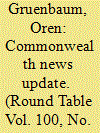

|
|
|
|
|
| Publication |
2011.
|
| Summary/Abstract |
Britain's worst riots since the 1980s erupted in London and other cities; 10,000 extra police went on to the streets but it was three days before order was restored. India's preparations for the 2010 Commonwealth games were plagued by corruption and 15 times over-budget, auditors found. The Islamist militant group Boko Haram targeted the UN in Nigeria with a suicide bomb. The anti-corruption campaigner Anna Hazare won increasing support in his stand-off with the Indian government. A state of emergency was declared in Trinidad after a spate of drug-related murders. The Gambia's suppression of the media intensified with seven people facing the death penalty for distributing T-shirts criticising President Jammeh.
|
|
|
|
|
|
|
|
|
|
|
|
|
|
|
|
| 2 |
ID:
107087
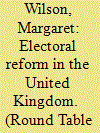

|
|
|
|
|
| Publication |
2011.
|
| Summary/Abstract |
Proposals by the UK Coalition government, which came into power in May 2010, to alter the electoral system for the Westminster Parliament have generated much debate and some controversy. The central plank of the campaigners for reform, viz. the introduction of a form of proportional representation, has been tried in New Zealand for some years now in the form of a mixed member proportional system. This article explains how that system came into being and how it has fared in the nearly two decades for which it has been in existence.
|
|
|
|
|
|
|
|
|
|
|
|
|
|
|
|
| 3 |
ID:
107089
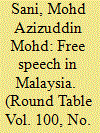

|
|
|
|
|
| Publication |
2011.
|
| Summary/Abstract |
This article attempts to explore the introduction and progress of the idea and concept of free speech in Malaysia. It demonstrates that the idea of freedom and liberty has existed since the feudal period of the Malay Sultanate. However, the idea was very limited owing to constraints imposed by the feudal kings. The people saw the kings as divine figures. When the British colonised the Malay states, they introduced the modern Western concept of free speech. This was later embedded in the Malayan/Malaysian Constitution during the country's independence in 1957 as one of the essential fundamental liberties of the people. However, the British were also responsible for introducing several repressive laws, such as the Printing Presses and Publications Ordinance. The Malaysian government continued this policy after independence to the detriment of the practice of free speech in the country.
|
|
|
|
|
|
|
|
|
|
|
|
|
|
|
|
| 4 |
ID:
107086
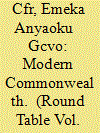

|
|
|
|
|
| Publication |
2011.
|
| Summary/Abstract |
This article is based on a speech delivered by Chief Anyaoku on 5 July 2010 in London, as part of the joint centenary celebrations of this journal and the Royal Over-Seas League. The article offers the author's reflections on the achievements and the challenges of the Commonwealth, and provides some advice on how the organisation should develop for the future. In particular, Chief Anyaoku reiterates the need for the Commonwealth to remain true to its fundamental principles and to advance and promote its core values.
|
|
|
|
|
|
|
|
|
|
|
|
|
|
|
|
| 5 |
ID:
107088
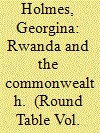

|
|
|
|
|
| Publication |
2011.
|
| Summary/Abstract |
As with most British media coverage in 1994, the BBC did not report genocide in Rwanda, preferring instead to depict political violence as tribal civil war and 'primitive' ethnic conflict. Yet when the international community declared that genocide had taken place, the BBC was quick to change its tack, moving away from reporting ethnic conflict towards memorialising genocide. Referring to the BBC's website, political discussion programmes and documentary films, the article considers how over time an institutional narrative on the 1994 genocide has developed. The author argues that the BBC has been required to reconcile the problem of depicting genocide-conventionally seen as modern, 'Western' political violence-in Africa. The ways in which the BBC has remembered Rwanda's genocide also conceal from view British foreign policy decision-making between April and July 1994. The author then considers how, since Rwanda joined the Commonwealth in November 2009, the BBC's reporting has shifted again-this time towards framing news in the context of democracy and freedom of speech.
|
|
|
|
|
|
|
|
|
|
|
|
|
|
|
|